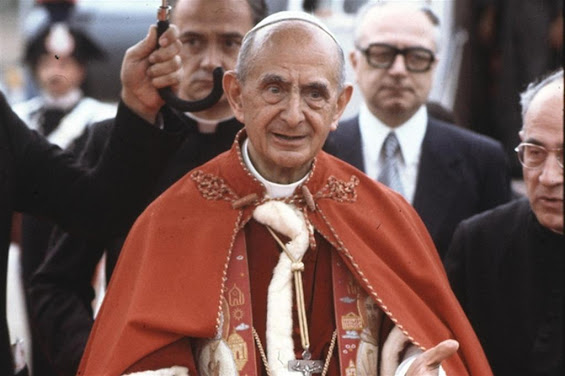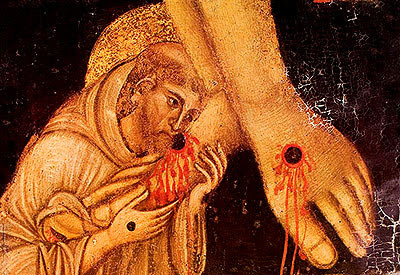The Pope of the Encyclical
News has come through that the Congregation for the Causes of Saints has approved a miracle in the case of Blessed Pope Paul VI. They have accepted that an unborn child who was suffering from a fatal disease was healed miraculously following prayer to Blessed Paul. It remains now for the Pope to examine the case and give his decision. That is expected to be positive, and with his signing of a Decree on the miracle, the way will be clear for Blessed Paul's canonisation. It may well take place later this year.
There has been a mixed reaction to the news. While many welcome the advancement of the Cause, others are branding the miracle a fake and see in Paul's glorification the ungodly advance of the Second Vatican Council and the Novus Ordo Mass. To be honest I am not going to address these complaints because at the end of the day those who are making them have made their minds up already and no argument will lead them to reconsider. From personal experience I know the Congregation for the Causes of Saints is extremely strict when it comes to reported favours and it is very hard to get a miracle through: the slightest doubt will see the dossier out the window.
Saints are not made by the Church, but by God; the Church merely recognises them. The request for a miracle is a request made by the Church to God to grant a heavenly sign so the Church can be sure that a particular individual is in heaven, is interceding for the Church, is a model for the faithful and they can now be publicly venerated within the Church's liturgy and with popular devotions. When beatifying and canonising individuals neither God nor the Church approves of all the Saint did, aware that they like all of us were sinners, made mistakes and said and wrote things that were not entirely great. That said, despite sins and mistakes, the investigation into an individual aims to examine if the person practiced virtue to a heroic degree, or in the case of a martyr, died for Christ and the Church.
Blessed Paul VI will not be canonised for everything he did, and his glorification is neither God's nor the Church's endorsement of his mistakes. As a pope some of his mistakes were greater than if he were a layman and there are many things he could have done better - Paul would be the first to acknowledge that. And lest we think he alone is worthy of castigation for mistakes, we can look at the pontificates of many Saint-popes and see they don't escape either. The first pope was a disgrace - he had the privilege of knowing Christ and yet he denied the Saviour three times and deserted the Lord in his hour of need; indeed his record up to then was not exemplary either. Yet Peter was chosen despite all his imperfections and he governed the Church with his imperfections; one of his papal mistakes was so grave St Paul had to rebuke him publicly. This was how the papacy started and it continues in a similar line. Among Blessed Paul's predecessors, one whom I have a great regard for, St Pius V, made a fatal error in his dealings with Elizabeth I. His excommunicating her may well have reflected the reality of her situation, but his absolving her subjects of loyalty to her (which I know was part of the effect of the excommunication of a Christian ruler) cost the lives of numerous innocent men and women. He could have handled it better, but it did not prevent his canonisation.
We can see providence at work in the glorification of Blessed Paul. I love Blessed Paul - he was my first pope, though I do not remember him at all. That said, I am not blind to his faults, but neither am I blind to his virtues and where lies the means to his sanctification: Humanae Vitae. Paul will be, for me, the Pope of the Encyclical because that short letter is the key to his holiness and the reason, I believe, God is raising him up. While we cannot say God is canonising everything Paul did, I think we can say God is canonising the prophetic document he wrote and he is doing so at a time when everything Paul said would happen is happening and, to its cost, society is rejecting the Gospel of Life which this document celebrates. Indeed the fact that the two miracles which have led to his glorification involves unborn children confirms this, I believe. Paul suffered for that encyclical. He stood firm for the truth even when so many Catholics, bishops among them, apostatised and rejected the truth. He endured the arrogant rebukes of cardinals and bishops, the desertion of priests and nuns, the anger of the confused who never read the document and had been sold the lie, and he was perhaps one of the first popes to face the wrath of the modern, secularist media. And greater than all this, within his soul that terrible darkness of fighting doubt and the temptation to despair but trusting in the only one who truly knew him: Christ.
A priest-friend of mine once described Pope Paul as a poet, a man of great sensitivity and compassion; a man that was sometimes easily led (take note of this when it comes to considering his liturgical changes). He had some strange ideas, but working among the ordinary people of Italy with all their views and opinions as he did, that might be expected, but he was solid and orthodox in his faith. When Pope St John XXIII set up the commission to examine artificial birth control its report was not expected to be so radical, though many expected a change in Church teaching. Paul may well have agreed with their views, and if he was still just a Cardinal he may well have supported their recommendation to permit limited contraception. But Paul was not a cardinal, he was pope when the report landed on his desk. In those moments of his first reading of that report we may well have seen the birth of the Saint: he took in what they wrote, considered the evidence, the principles, the cry of the faithful, but there was something else that could not be ignored, could not be jettisoned: the teaching of God. In those moments Giovanni Battista Montini died; Paul, Successor of Peter, emerged to proclaim the truth and take up the cross.
In time, Paul's mistakes will be corrected, I have no doubt of that: the Church is in God's hands. But his witness will remain for the good of the Church. Humanae Vitae is prophetic, it was an eloquent testimony to the value of human life, particularly the lives of the most vulnerable. It speaks of the nobility of man and woman within the plan of God, human beings redeemed by Christ to inherit an eternal kingdom. It is a document which bears the marks of blood - the Blood of Jesus Christ which was poured out for all of us, and the blood of his servant Paul VI who suffered for the cause of life. I have no doubt the sufferings Paul bore, united with the suffering of Christ, were offered for all of those who struggled with this teaching and for all who opposed it.
I rejoice in Paul's glorification, and I do so now as my country is facing a battle for the cause of life. Blessed Paul is an ally in heaven for the pro-life cause, he knows the cost of defending the truth and the most vulnerable and it was a price he was willing to pay. Through his intercession may God grant all of us the grace to be so generous and charitable. May the soon to be Saint Paul VI come among us and help us; to encourage us to embrace the cross and to rejoice in it for the sake of souls.



Comments
Post a Comment